NameCheap vs GoDaddy vs HostGator: Which is the Best?
Namecheap vs GoDaddy vs HostGator: Which web hosting service is best? Read on to find out.
We all know that choosing a web hosting provider is one of the most important decisions when starting a blog or business.
The right hosting platform can help you thrive, but the wrong one could be like a nail in your coffin.
So how do you know which one is right for you?
There are a lot of factors to consider, and the answer isn’t always clear-cut.
That’s why we’ve compared three popular website hosting providers: Namecheap, Godaddy, and Hostgator.
In this article, we’ll compare the three hosts on several factors, including price, features, customer support, and more.
We’ll also highlight the pros and cons of each hosting provider so that you can decide which is suitable for your website.
Let’s get started!
TL;DR:
Namecheap vs GoDaddy vs HostGator: Which one is better?
Ans: If you want a quick and easy answer, HostGator is the clear winner.
It offers more features and better performance than the other two companies. It also has many plans, so you can find one that’s just right for your business.
Namecheap and GoDaddy are excellent options but not as good as HostGator.
Keep reading if you’re looking for a more detailed comparison of each service.
Namecheap vs GoDaddy vs HostGator – Overview
Before diving into the in-depth comparison, let’s briefly overview the three web hosts.
Namecheap
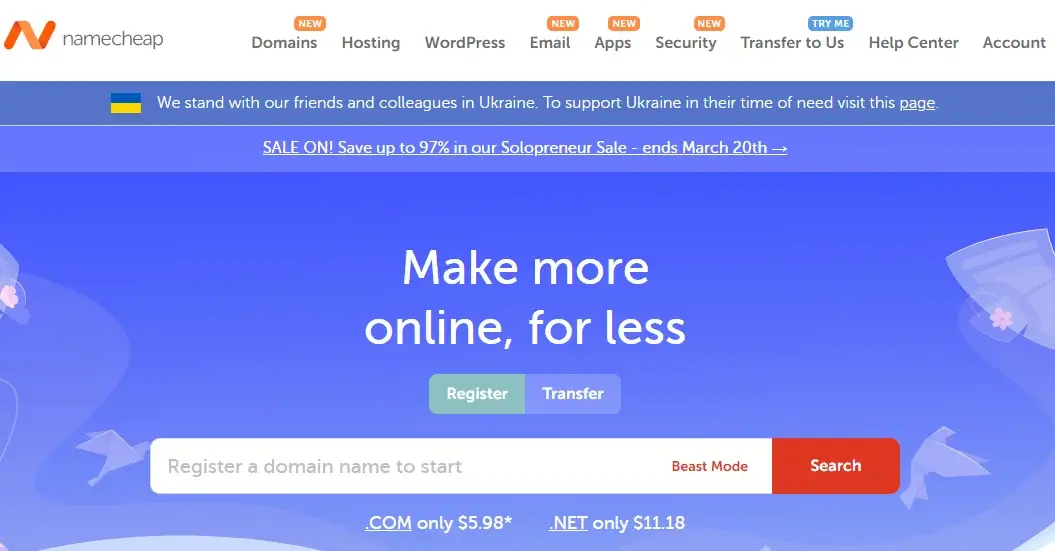
Namecheap is one of the world’s most popular domain registrars and web hosting companies.
It was founded in 2000 and has since become one of the most trusted names in online services, with over 17 million domains registered through its site.
Namecheap offers a wide range of hosting services, including shared hosting, WordPress hosting, reseller hosting, dedicated servers, and VPS (virtual private server) plans.
You can choose from many different pricing tiers depending on how much storage space and bandwidth you’ll need for your website or application.
In addition to domains and hosting, Namecheap offers various services, including VPNs, Premium DNS, website security, cyber insurance, etc.
Their pricing is very reasonable, with shared hosting plans starting at just $1.58 monthly.
This plan includes three domains, email accounts, 20 GB of storage space, unmetered bandwidth, free SSL, etc. It’s an excellent option for small businesses and bloggers with few visitors yet.
Overall, Namecheap is a great option for anyone who wants an affordable hosting service that’s easy to set up and manage.
GoDaddy
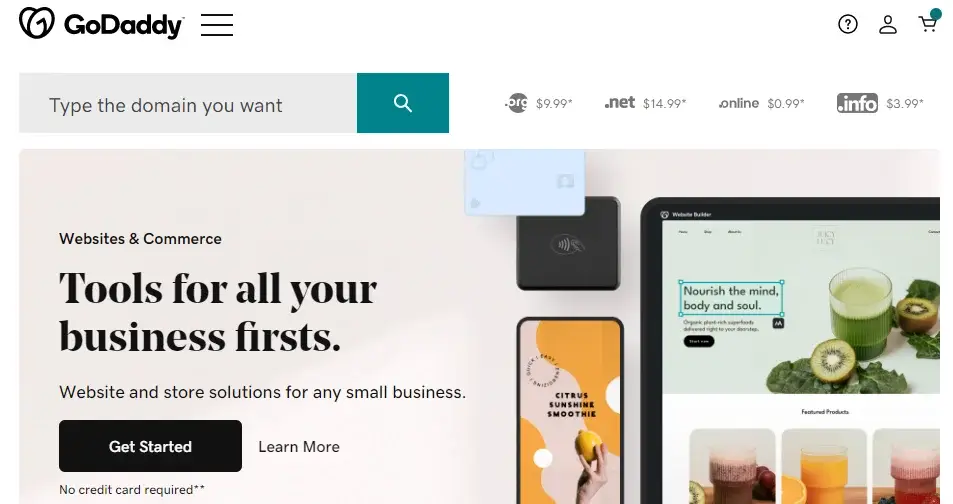
GoDaddy is a leading web hosting company and domain name registrar. It’s been in business since 1997 and is currently the most prominent host, with over 77 million domains.
Since its founding, GoDaddy has acquired several other companies, including Media Temple, a web hosting service; Securi, a cloud security provider; Canary, a Calendar service; etc.
GoDaddy’s services include domain name registration, web hosting, email, and security products.
The company also offers a variety of online tools and services, including website builders, website design, and search engine optimization (SEO) tools.
GoDaddy’s shared hosting plans start at $5.99 per month and go up to $129.99 for a dedicated server plan, all of which come with 24×7 support and a 30-day money-back guarantee.
GoDaddy’s main rivals in the web hosting industry are HostGator, Bluehost, DreamHost, and InMotion Hosting.
HostGator
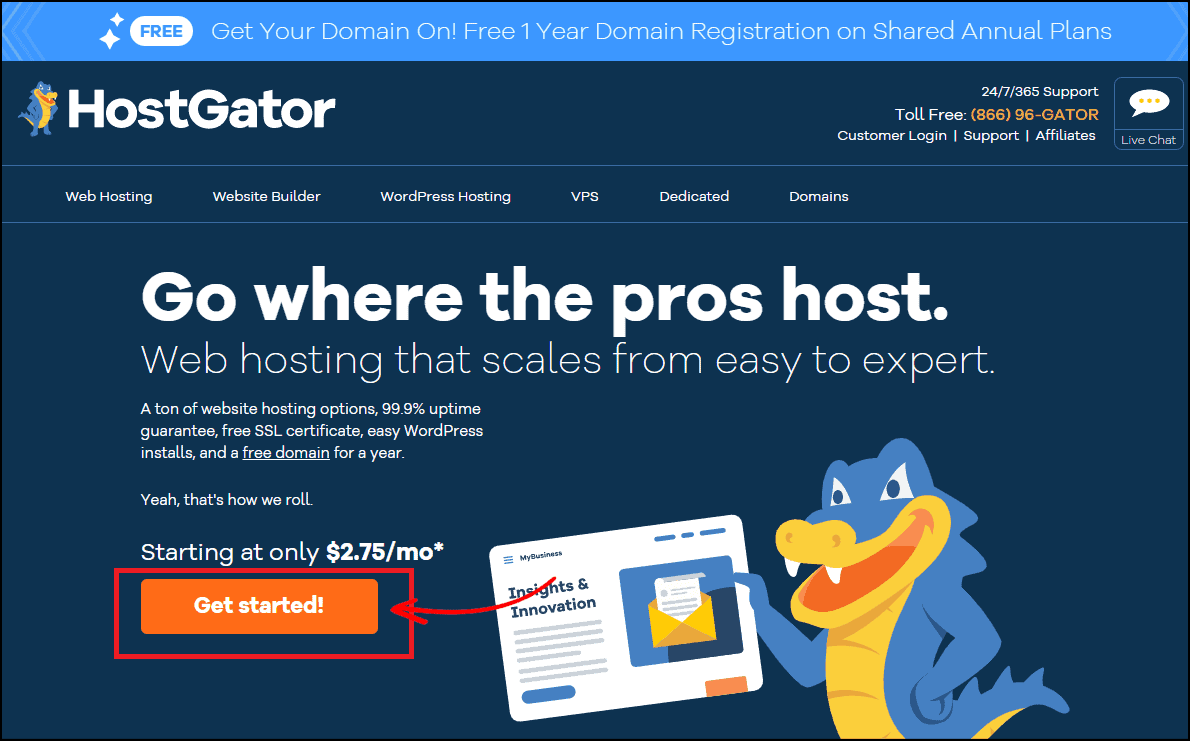
HostGator is a web hosting company based in Austin, Texas. The company was founded in 2002 by Brent Oxley and is now owned by Endurance International Group.
HostGator’s parent company, Endurance International Group (EIG), owns more than 60 hosting companies across the globe. Some of these include Bluehost and iPage.
The company offers a variety of plans for individuals and businesses, including shared hosting, VPS hosting, and dedicated servers.
It also provides a free domain name with every web hosting plan purchase.
But what sets HostGator apart is its competitive pricing, excellent customer support, and user-friendly interface.
The company’s shared hosting plans are among the most affordable in the industry, with prices starting at $2.75 per month. This includes unlimited data transfer, 10 GB storage space, 24×7, as well as free domain registration.
They also offer a 30-day money-back guarantee on all its plans, so you can try them risk-free.
Here are some key areas where Namecheap, GoDaddy and HostGator differ.
Namecheap | GoDaddy | HostGator | |
|---|---|---|---|
Price from | $1.58 | $5.99 | $2.75 |
Free .COM domain | |||
Storage | 20 GB – Unlimited | 25 – 100 GB | 10 GB – Unlimited |
Control panel | Custom (hPanel) | Custom (Site Tools) | Custom |
Speed | 329 ms | 292 ms | 665 ms |
Uptime | 99.93% | 99.96% | 99.93% |
Server locations | Europe, USA, and United Kingdom | Europe, Asia, and USA | USA and Asia |
Free Migration | |||
Money back | 30 days | 30 days | 30 days |
My rating | 4.3 | 4.0 | 4.7 |
Discount | Up to 65% | Up to 40% | Up to 73% |
Website | www.namecheap.com | www.godaddy.com | www.hostgator.com |
Namecheap vs GoDaddy vs HostGator: What We Compared
To compare Namecheap, GoDaddy and HostGator, we focused on the following aspects:
- Ease of Use
- Features
- Performance
- Security
- Pricing
- Customer Support
- Customer Rating
- Final Verdict
- SiteGround vs Hostinger: Faqs
- Alternatives
1. Dashboard Ease of Use
As a website owner, you want to ensure your hosting service provider is easy to use.
You want a simple interface that makes it easy for you to manage your site.
A good hosting platform offers an intuitive user interface, so you can set up and manage your website no matter what your technological background.
In addition, you should be able to easily access all the features of your hosting plan, including domain name manager, email accounts, website builder, etc.
But, when it comes to Namecheap vs GoDaddy vs HostGator—which is the easiest to use? And most importantly, which one offers users an optimal experience?
To find out which hosting platforms are the easiest to use, we compared them according to various criteria. We considered two factors, including:
- Set up time: The time it takes to set up your website and the number of steps you need to take.
- User interface: The overall functionality of the user interface and how easy it is to navigate through the site.
First, we will look at how long it takes to set up an account.
1.1. Hosting Setup Process
The registration process for Namecheap, Godaddy, and Hostgator is similar. You must go through several steps—creating an account, entering your payment information, and confirming your domain name and email address.
Once you’ve completed these steps, you can access the control panel to get started with your website.
However, while testing the account setup process, we noticed that HostGator had a slight advantage over Namecheap and Godaddy.
It’s because HostGator has a single-page account creation process that allows you to complete all the steps in one go.
On the other hand, Godaddy and Namecheap have separate pages for each step of account creation.
If you’re trying to set up a hosting account as fast as possible, then HostGator is your best bet.
Next, we will look at how easy it is to manage your hosting account.
1.2. User Interface
The user interface (UI) is how a hosting provider presents its features and functions to you.
The UI is the first thing you will see when logging into your hosting account. It’s also the primary interface through which you’ll manage your website.
So an easy-to-use UI is essential!
In our case, we found that HostGator had the best user interface among all three hosting providers.
The UI of HostGator is very intuitive and easy to use. It has all the features to manage your hosting account and website.
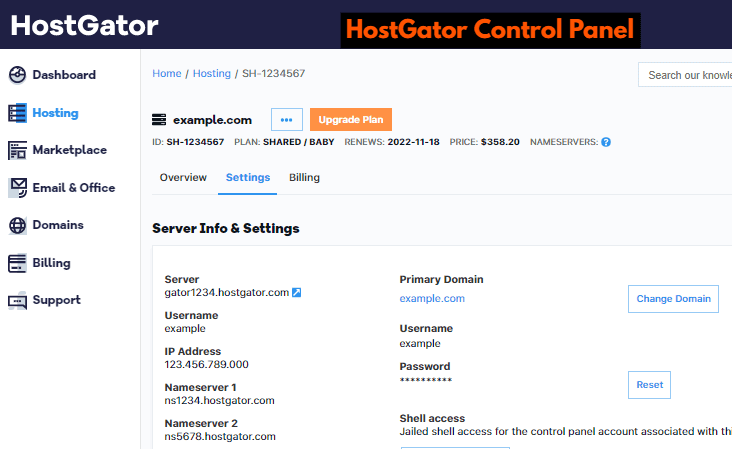
For example, you can easily create an email from the email management section. You can also easily install WordPress and other software through their one-click installer.
In addition, HostGator has a support section where you can find answers to all your questions.
But we liked the fact that HostGator doesn’t provide any unnecessary features. Everything is streamlined and straightforward, so you can focus on what matters: creating a great website!
Namecheap has a similar user interface, but fewer features than HostGator’s platform.
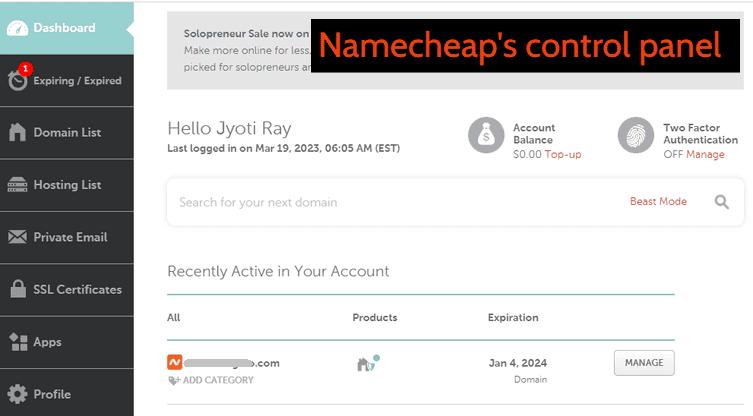
Their platform is also straightforward to use, making it ideal for beginners. It has a one-click installer that makes installing WordPress simple and fast—all you have to do is click once!
But the UI could be more polished than HostGator’s, but it still works well.

GoDaddy’s user interface is designed to be beginner-friendly, but it can also be confusing at times. They have a lot of features and settings that may confuse new users who are unfamiliar with them.
Summary – Ease of Use
Q: Which host’s control panel is easier for beginners: Namecheap, GoDaddy, or HostGator?
Ans: Based on our experience, HostGator’s control panel is the easiest for beginners. It has a simple and intuitive interface while still providing all of the necessary website management features.
Winner: HostGator
3. Namecheap vs GoDaddy vs HostGator – Performance
Hosting Performance is an essential factor when choosing a web hosting service.
If your website takes too long to load, you’ll lose visitors and miss out on potential revenue.
So, what is the best web hosting service for performance?
In this section, we’ll compare the performance of HostGator, GoDaddy, and Namecheap.
We’ll look at how their hosting stacks against each other regarding uptime, load times, and server response time.
3.1. Hosting Uptime
The most crucial factor in choosing a web host is uptime. Uptime refers to the amount of time that your website is accessible, and it’s something every business owner should consider.
We tested the uptime for each of these companies using Pingdom. The results are as follows:
GoDaddy has an uptime of 99.98%, which means it only goes down 0.02% of the time—that’s pretty impressive! HostGator also has an excellent uptime score of 99.96%. Namecheap’s uptime score isn’t as good as the other two companies, with an uptime of 99.91%.
Uptime | Namecheap | GoDaddy | HostGator |
|---|---|---|---|
| January 2023 | 99.99% | 100% | Cell |
| December 2022 | 100% | 100% | Cell |
| November 2022 | 100% | 100% | Cell |
| October 2022 | 100% | 100% | Cell |
| September 2022 | 100% | 100% | Cell |
| August 2022 | 99.96% | 100% | Cell |
| 6 months average uptime | 99.99% | 100% | Cell |
3.2. Speed test
Speed is another critical factor because it directly impacts how quickly your website loads for users. If your site takes too long to load, you’ll lose visitors and miss out on potential revenue.
So, how do HostGator, GoDaddy, and Namecheap compare when it comes to speed?
To determine this, we ran a series of tests on each provider’s servers. We tested the speed at different times of day and used multiple testing tools to ensure accuracy.
3.3. Stress test
A stress test is a load simulation that simulates thousands or even millions of visitors simultaneously. It can help you identify potential bottlenecks in your hosting environment and determine whether it’s well-equipped to handle large traffic spikes.
We used Blitz.io to run a stress test on each provider’s server. Blitz is a free third-party tool that allows you to simulate traffic spikes and measure how well your website performs under pressure.
4. Namecheap vs GoDaddy vs HostGator – Security
Security is one of the most important things to consider when choosing a web hosting service.
After all, your website is one of your most valuable assets. Your business could suffer severe damage if it gets hacked and becomes inaccessible.
That’s why it’s essential to choose a web hosting provider with robust security features, such as DDoS protection, malware scan, firewall, etc.
In this section, we will go through the security features that each company offers, then compare them side-by-side.
5. Namecheap vs GoDaddy vs HostGator – Pricing
When deciding between Namecheap, GoDaddy, and HostGator, it’s essential to consider their pricing.
Because if you’re on a budget, getting the most for your money is essential.
To help you decide, we’ve created a chart comparing the prices of each company’s most popular hosting plans.
We’ve also included their renewal rates and additional costs (if any), so you can see how much each plan will cost over time.
5.1. Namecheap’s Plans and Pricing:
Namecheap offers a range of web hosting plans and pricing options to suit different needs and budgets.
Their plans include shared hosting, WordPress hosting, VPS hosting, Reseller, and dedicated servers.
The pricing varies depending on the hosting type and the subscription duration.
Shared hosting plans start at $158 per month for the first year, while WordPress hosting plans start at $24.44 monthly.
Some of their top-level dedicated server plans start at $48.88/month, and VPS is available for $6.88.
Here are a couple of their most popular web hosting plans:
HostGator offers various hosting plans catering to different needs and budgets.
Their Shared Hosting plans start at $2.75 monthly and offer unlimited bandwidth, free domain, and email accounts.
Their WordPress Hosting plans start at $5.95 per month and include automatic WordPress updates and security features.
HostGator’s VPS Hosting plans start at $23.95 per month and offer increased performance and flexibility compared to Shared Hosting.
HostGator’s Dedicated Hosting plans for businesses with high-traffic websites provide complete control over the server and start at $89.98 per month.
They also offer Reseller Hosting plans starting at $19.95 per month for those who want to resell hosting services to their clients.
Here is a breakdown of HostGator’s plans:
GoDaddy is more expensive than HostGator and Namecheap.
GoDaddy’s shared plans start at $4.99 per month for the basic plan, which offers up to 50 email accounts, 25 GB of space, and a free domain name.
Their WordPress plan starts at $8.99 per month for the basic plan, which offers up to 20 GB of space, 1 domain, daily malware scans, etc.
Their basic VPS plan costs $4.99 monthly and offers up to 1 CPU core, 1 GB RAM, 20 GB storage, etc.
Their most expensive dedicated plans cost $129.99 monthly, including up to 32 GB RAM, more storage, and powerful CPUs.
6. Namecheap vs GoDaddy vs HostGator – Support
When choosing a web host, it’s essential to consider the company’s support options.
You’ll want to ensure you get the support you need from your hosting company.
Some companies offer live chat and phone support, while others prefer email only.
In the following section, we’ll compare the support options each of these companies offers.
We will also examine the average response time, resolution rate, and overall customer satisfaction.
6.1. Namecheap’s Support
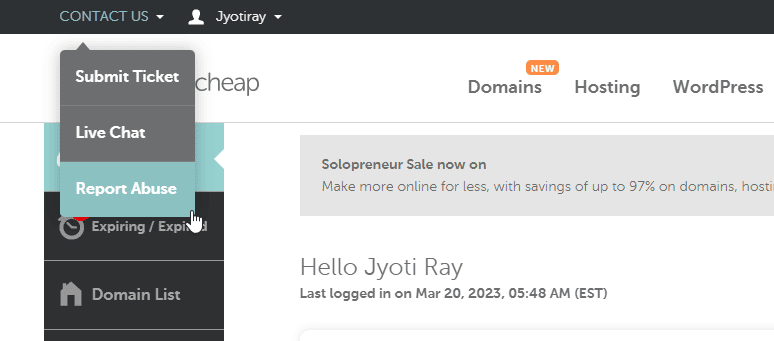
Namecheap’s customer support is highly regarded for its quality and responsiveness.
The company offers 24/7 support via live chat, and ticketing system, allowing you to contact a human representative anytime.
Namecheap also provides a comprehensive knowledge base with articles and tutorials covering various topics related to hosting, domains, security, and more.
One of the notable features of Namecheap’s customer support is its commitment to transparency and honesty.
The company’s representatives don’t try to sell you unnecessary services or mislead you with false information. They will tell you what is best for your website, not what benefits Namecheap the most.
Namecheap’s customer support also deserves credit for its speedy response time.
When we contacted them via live chat regarding domain forwarding, we received a response in just a few seconds. The representative also answered all of our questions thoroughly and professionally.
6.2. GoDaddy’s Support
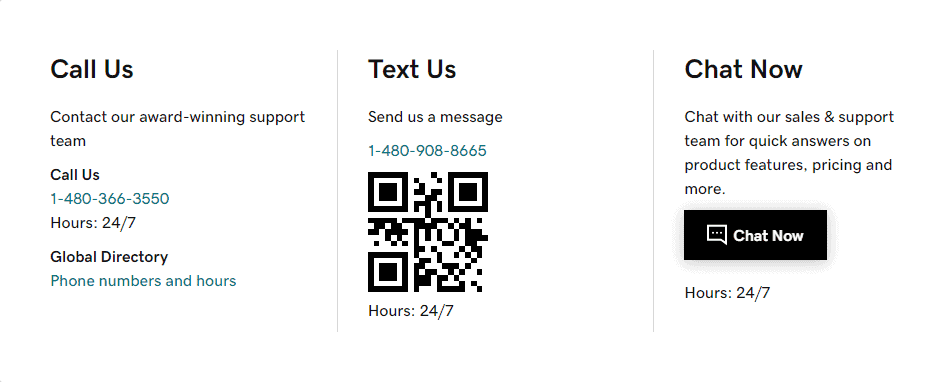
GoDaddy’s customer support is available 24/7 via phone, and live chat.
The company has invested heavily in its customer service infrastructure, and its support team is generally regarded as responsive and helpful.
One of the standout features of GoDaddy’s customer support is its extensive knowledge base, which includes a large collection of articles and tutorials covering various topics related to hosting, domains, and other services.
The company also offers a community forum where customers can connect and get help from more experienced users.
However, some customers have criticized GoDaddy’s support for being too focused on upselling and trying to sell additional services or products rather than addressing their specific concerns.
Additionally, some customers have reported longer-than-expected wait times for phone and live chat support.
During our tests, we experienced long wait times in the live chat department. And while the phone support representative was very friendly and helpful, it took a few minutes to get connected.
Overall, GoDaddy’s customer support is a mixed bag.
6.3. HostGator’s Support
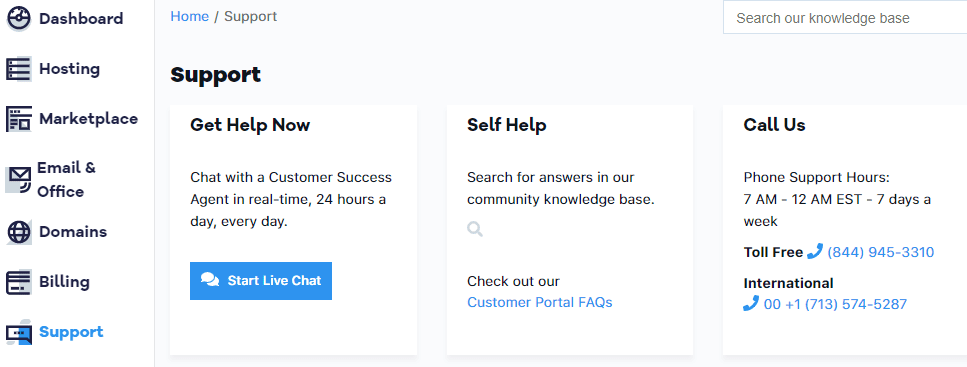
HostGator offers customer support through various channels, including live chat and phone.
Their support team is available 24/7 to assist customers with issues or questions.
Additionally, HostGator offers a comprehensive knowledge base with articles and tutorials to assist customers in troubleshooting common problems.
While some customers have reported longer wait times during peak hours, most customers have had positive experiences with HostGator’s customer support.
Customer Support | Namecheap | GoDaddy | HostGator |
|---|---|---|---|
Support Options | Live chat and support ticket | Live chat and phone | Live chat and phone |
Availability | 24×7 | 24×7 | 24×7 |
Response time | Fast | Slow | Average |
Overall Experience |
Summary – Customer Support
Q: Which company provides the best customer service – Namecheap, GoDaddy or HostGator?
Ans: Based on our experience, we found that Namecheap offers the best customer service among these three companies. They have a great customer service team that is very responsive, easy to contact and helpful in resolving any issues.
Winner: Namecheap
8. Namecheap vs GoDaddy vs HostGator – Final Verdict
In our Namecheap vs GoDaddy vs HostGator comparison, we’ve compared the three hosting companies on several factors, including price, customer service, and features.
Ultimately, HostGator is the best choice for most people.
It’s reliable and affordable, plus some cool features to grow your business. It also has a significant uptime score and excellent customer service.
If HostGator doesn’t work for you, we recommend using Namecheap instead. It’s another reliable and affordable hosting provider with everything you need to start a website.
Namecheap | GoDaddy | HostGator | Winner | |
|---|---|---|---|---|
Ease of Use | HostGator | |||
Features | HostGator | |||
Performance | Tie | |||
Security | Tie | |||
Pricing | Namecheap | |||
Support |
3 Best Alternatives to Namecheap vs GoDaddy vs HostGator
If you’re looking for an alternative to Godaddy, Namecheap, and Hostgator, we’ve got you covered.
We’ve compiled a list of the best hosting services you can use as an alternative to these three.
Here are the alternatives:
1. Bluehost

Bluehost is among the best alternatives to HostGator, Namecheap, and Godaddy.
The company was founded in 2003 and had over 2 million websites hosted on its servers.
They offer a free domain name for the first year, and their plans start at just $2.95 per month.
Their plans include everything from unlimited bandwidth to unlimited email addresses and everything in between, so you can get precisely what you need for your site.
Bluehost also offers a 30-day money-back guarantee, so you don’t have to worry about committing to a plan before trying it out.
2. Hostinger
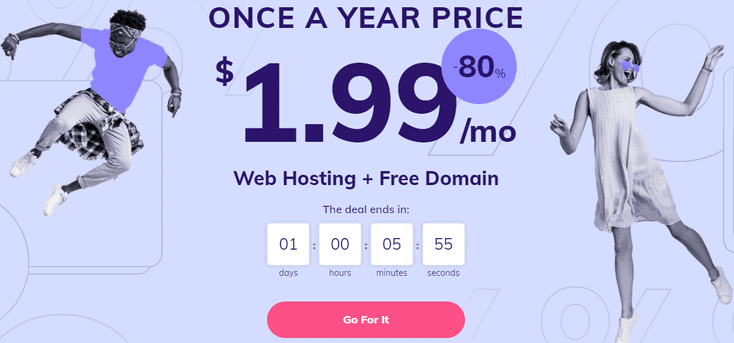
Hostinger is a budget-friendly web hosting provider offering affordable hosting plans without compromising quality.
The company’s hosting plans include free domain names, SSL certificates, and a powerful control panel that makes managing your website easy.
Hostinger’s shared hosting plans range from $1.99/mo to $3.99/mo, making it an excellent option for bloggers looking for a reliable host that won’t break the bank. The company also offers VPS, cloud, and WordPress hosting plans.
Hostinger’s customer support team is available 24/7 via live chat and email.
3. GreenGeeks
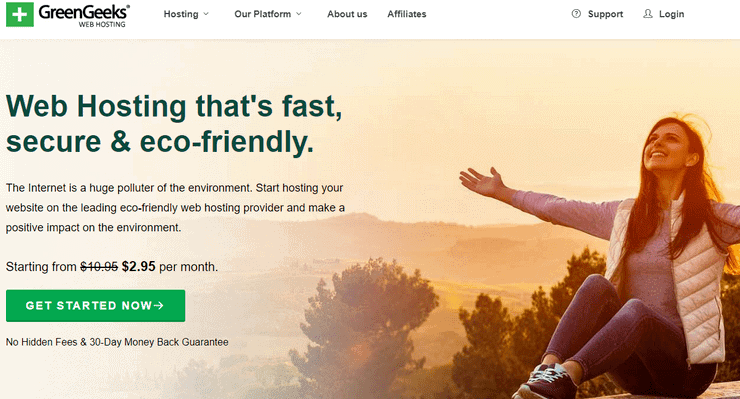
GreenGeeks is a web hosting provider that focuses on environmentally friendly hosting solutions.
The company uses renewable energy to power its servers, which makes it an ideal choice for website owners who want to reduce their carbon footprint.
GreenGeeks offers various hosting plans, including shared hosting, VPS hosting, and reseller hosting.
The company’s hosting plans include a free domain name, SSL certificate, and unlimited bandwidth.
GreenGeeks offers a 30-day money-back guarantee and 24/7 customer support via live chat, phone, and email.
FAQs:
Q1: Is Namecheap better than HostGator?
Ans: The answer is yes and no. It depends on your needs.
Both HostGator and Namecheap are great hosting providers offering many features and benefits.
Namecheap is an excellent choice for beginners who are looking for low-cost hosting.
Q2: Can I transfer my existing website to any of these hosting providers?
Ans: You can transfer your existing website to any of these hosts. Namecheap and HostGator offer free migrations for new customers, whereas GoDaddy charges $69 for the migration service.
Q3: Which is better – Namecheap or GoDaddy?
Ans: While Namecheap and GoDaddy are reputable domain name registrars, we recommend Namecheap for its pricing, ease of use, and variety of features.
Q4: Is HostGator better than GoDaddy?
Ans: Yes, HostGator is better than GoDaddy in many ways. First of all, HostGator offers more value for the money. It’s also easier to use and has better customer support.
Q5: Does GoDaddy own Namecheap?
Ans: No. Namecheap is an entirely separate company from GoDaddy. It’s not owned by GoDaddy and doesn’t share any ownership or management with it.
Q6: Which web hosting company is the cheapest?
Ans: Namecheap is generally considered the most affordable web hosting option, offering competitive pricing for shared hosting plans, domain registration, and other services.
Q7: Do these web hosting companies offer website builder tools?
Ans: Yes, all three companies offer website builder tools that make it easy to create a website without any coding experience. Namecheap’s website builder is called EasyWP, while GoDaddy offers its own website builder and HostGator provides access to Weebly’s website builder.
More GoDaddy comparisons you may like:
More HostGator comparisons you may like:
- HostGator vs A2 Hosting
- HostGator vs SiteGround
- HostGator vs HostMonster
- HostGator vs Arvixe
- HostGator vs DreamHost
- HostGator vs HostPapa
*This post may have affiliate links, which means I may receive a small fee if you choose to purchase through my links (at no extra cost to you). This helps us to keep WPMyWeb up and running and up-to-date. Thank you if you use our links, we really appreciate it! Learn more.
